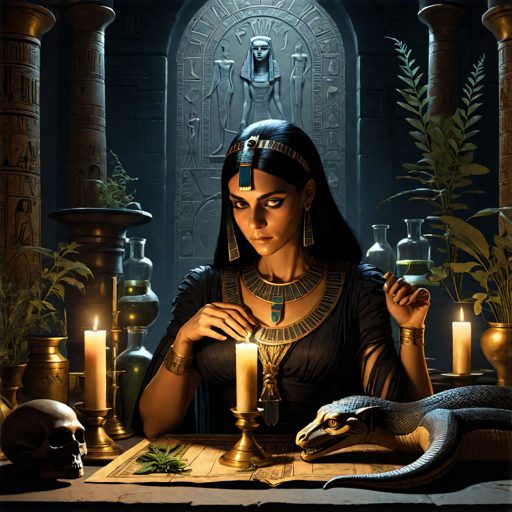
Cleopatra Philopator: Queen of Poisons & Philosophy
Recommended for Ancient Egypt
Forget the femme fatale painted in Hollywood epics. Cleopatra Philopator, Egypt’s final active pharaoh, captivated far beyond mere beauty. Whispers hinted at her membership in an ancient, hidden order, sworn to protect her unorthodox pursuits.
Imagine stepping into the opulent halls of the Ptolemaic palace in Alexandria. Flickering torches cast long shadows, barely illuminating the hieroglyphic murals that whispered of forgotten pharaohs.
A lone figure, draped in shimmering robes of emerald green, stands amidst a flurry of activity. This is Cleopatra Philopator, not the seductive siren of legend, but a scholar, a scientist, a mind as sharp as any scimitar.
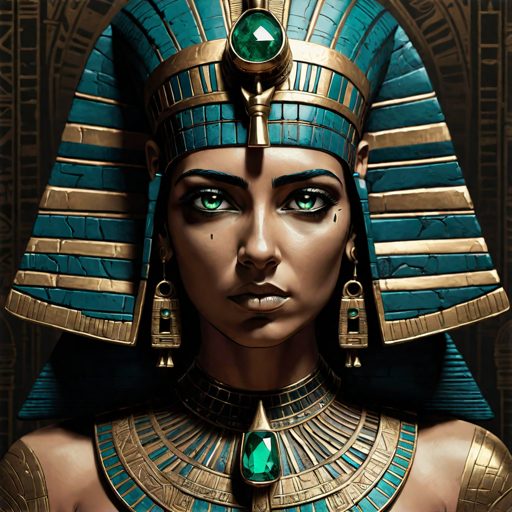
Ancient Egyptian portrait of Queen Cleopatra Philopator, focus on her intense gaze and a hint of emerald jewelry
Intrigued? Then prepare to delve beyond the glittering facade of courtly intrigue. This is the story of a queen who wielded knowledge as fiercely as any political alliance. Cleopatra’s reign wasn’t just about power struggles and tempestuous romances with Roman leaders.
It was a time when the very fabric of knowledge was being rewritten within the walls of the Great Library of Alexandria. And Cleopatra, unlike any pharaoh before her, was determined to be a part of it.
Cleopatra Philopator and the Great Library of Alexandria

Alexandria’s Great Library interior, sunlight on a single scholar surrounded by scrolls, atmosphere of ancient knowledge
The beating heart of Cleopatra’s world lay not between palace walls, but amidst the towering papyrus scrolls and whispered debates of the Great Library of Alexandria. Imagine its grand halls, the aroma of old parchment and the distant murmur of the sea. This wasn’t merely a repository of knowledge, it was the epicenter of the ancient world’s intellectual pursuits, a gathering place for the greatest philosophers, physicians, and mathematicians of the time.
Cleopatra, with her royal status and insatiable curiosity, had unparalleled access. The Library wasn’t just her playground, it was her arsenal. Yet, the tragic loss of countless scrolls in the great fires of Alexandria means many treasures are now lost forever.
Did Cleopatra’s own writings perish in those flames or are they still out there, preserved by the sands of time? Cleopatra Philopator understood that knowledge was power. These scrolls weren’t simply distractions, they were the raw material from which she’d forge her strategies, her understanding, and her distinct vision for Egypt’s future.
Cleopatra Philopator: Beyond the Legends
Cleopatra craved knowledge – an insatiable hunger coursing through her veins. Fluency in numerous languages – Egyptian, Greek, Hebrew, perhaps even Latin – wasn’t just a marker of intellect, it was a key. It unlocked original texts by philosophers, physicians, and historians across the Mediterranean, bypassing the need for translations.
Her interests weren’t limited to theory. Cleopatra Philopator’s embrace of the practical extended even into experimentation. Medicine fascinated her. Ancient writings hint at her involvement in dissections, the study of anatomy, and perhaps even the development of rudimentary cosmetics.
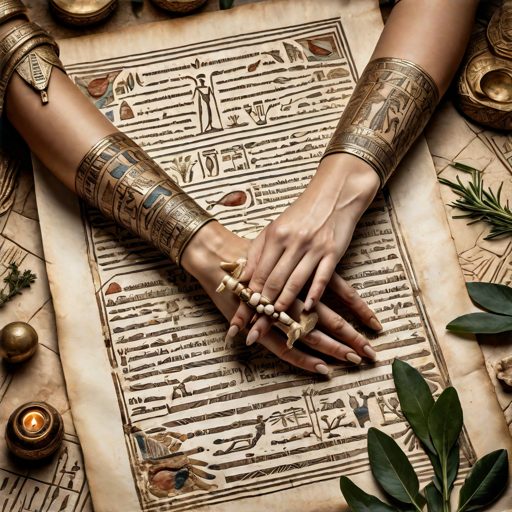
Close-up of Cleopatra Philopator’s hands stained with herbs, holding a scroll with anatomical drawings and ancient script
We can imagine her poring over ancient medical scrolls, her fingers stained with the juices of herbs and botanicals. Did she dream of remedies to heal her people, breakthroughs hidden within the natural world?
Yet, rumors painted a darker portrait. There were whispers of her working not just for the preservation of life, but its manipulation. Stories of exotic poisons crafted and tested, perhaps even upon prisoners brought trembling before the queen. Did this fascination extend beyond medicine, into the realm of covert power plays?
Was she a secret author? Did Cleopatra pen some of her own research? Were there lost scrolls bearing her signature, containing knowledge deemed too controversial even for the open-minded halls of Alexandria?
Cleopatra Philopator’s Secret Laboratory: Poisons and Power
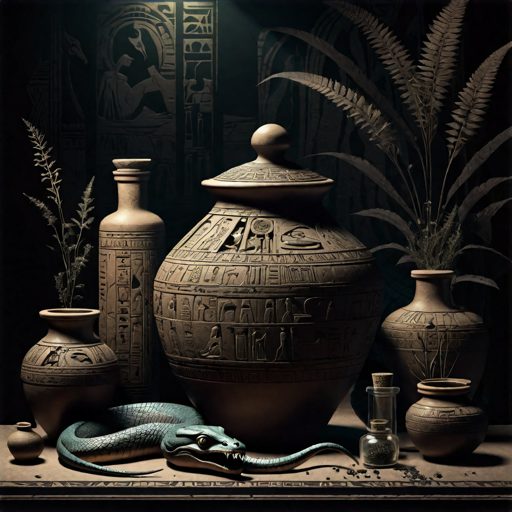
Ancient Egyptian apothecary scene: clay pot with serpent, dried herbs, glass vials, shadowy figure in the background
In a world of shifting alliances and simmering rivalries, knowledge wasn’t just power – it was survival. Cleopatra understood this, and her fascination with poisons and antidotes wasn’t mere morbid curiosity. It was an extension of her statecraft, a chilling form of diplomacy.
Myth & Toxins
Legends whispered of Cleopatra’s ancestors, blessed (or perhaps cursed) by Wadjyt, the cobra goddess. Wadjyt’s venom, both deadly and restorative, fueled their thirst for knowledge of toxins and antidotes. This legacy slithered through Cleopatra’s veins. The bite of an asp, a chalice of tainted wine…these were threats all too real for a queen surrounded by vipers.
Cleopatra, armed with her knowledge, meticulously studied toxins. Snakes, exotic plants, even minerals – she dissected them all, brewing concoctions in her laboratory. Whispers turned to accusations – hapless prisoners writhed as she tested the boundaries between life and death, a ruthless pursuit of mastery over the very poisons that could claim her throne.
A Queen’s Laboratory
Let’s picture a hidden chamber within the palace, far from prying eyes…Within these walls, a strange amulet was rumored to be found – cracked, yet bearing symbols that hint at a blend of scientific knowledge and mystical power.
Did she meticulously inscribe her findings on scrolls now lost to time? Formulas for deadly nightshade, or perhaps an antidote so rare, so potent, it was deemed worthy only of a pharaoh? Her devotion to Serapis, an Egypto-Greco god tied to healing and the underworld, adds another layer of mystery.
Were her experiments fueled by mere science, or influenced by her spiritual beliefs and the hope of finding protection in a realm beyond life?
The whispers surrounding the sudden demise of a political rival, a death some attributed to an undetectable poison, echo long after Cleopatra’s reign. Was her laboratory a place of scientific inquiry, or a chilling forge where she weaponized knowledge to protect her throne?
Philosophy Fit For a Ruler
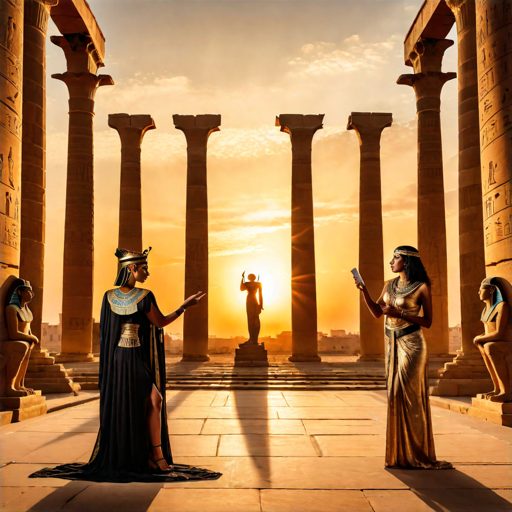
Sunset silhouette of Cleopatra Philopator in debate with a robed philosopher, scrolls at their feet, grand architecture in the background
Cleopatra’s world wasn’t just scrolls and laboratories. It was a whirlwind of political maneuvering, grand ambitions, and the weight of an ancient civilization upon her shoulders. Her studies weren’t mere diversions, but tools to guide her reign. History records her encounters with some of the era’s greatest minds, philosophers drawn to the radiant intellectual center that was Alexandria.
How did these debates shape her? Did she embrace the lofty ideals of Plato’s Republic, or the practical cynicism of the Stoics? Her legacy suggests a keen understanding of power, justice, and her own place in the grand tapestry of Egyptian history. Did Cleopatra Philopator draw upon these conclusions independently? Did the wisdom of those ancient philosophers guide her hand?
Echoes Across Time
Sadly, no treatise unquestionably penned by Cleopatra survives. Were her writings lost in the great fires that ravaged Alexandria? Do they perhaps lie in some undiscovered tomb, awaiting a glimpse of sunlight? Such a discovery would revolutionize our understanding of this enigmatic queen, offering a glimpse into the mind of Cleopatra Philopator. Yet, even without direct records, her influence reverberates.
Female intellectuals through the ages, from medieval scholars to Enlightenment figures, may have glimpsed a reflection of their own ambitions in the fragments of Cleopatra’s story. However, Cleopatra stands not only as a queen, but as an enduring symbol of the power and the peril a brilliant mind can hold.
Closing
The legend of Cleopatra Philopator endures. Centuries have passed, empires have risen and fallen, yet the whispers around Cleopatra persist. Cleopatra’s genius endures not only in what we understand, but in the mysteries that continue to fascinate us. Did she pen secret manuscripts, a legacy far more enduring than any marble monument?
Did the formulas for her potent poisons vanish with her final breath? Perhaps the greatest mysteries of her reign lie buried with her – a queen determined to leave her mark, not only upon the world, but upon the very pursuit of knowledge itself.
Related Stories
Curious Times is a leading newspaper and website for kids. We publish daily global news aligned to your learning levels (also as per NEP 2020): Foundational, Preparatory (Primary), Middle and Senior. So, check out the News tab for this. We bring kids’ favourite Curious Times Weekly newspaper every weekend with top news, feature stories and kids’ contributions.
Curious Times News Program for Schools for FREE. Over 5,000 schools and teachers from all over the world have joined our programme so that students and teachers can get FREE Educative Newspaper. Here, kids can take part in world events and win prizes and certificates for free through their schools.
The following social media platforms allow you to communicate with us: Instagram.
0 (Please login to give a Curious Clap to your friend.)
